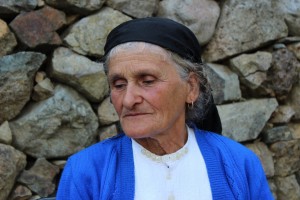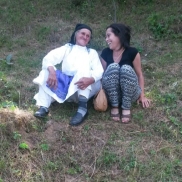After a week of shooting in the Albanian mountains, we return to the village of Puka to gather some supplies and enjoy wifi. We have been shooting at Lule’s house for a week and are overwhelmed by her hospitality and the cooperation of her family. Cousins, nephews, sisters in-law all help to make a portrait of their great-aunt Lule, who – as a teenage girl – decided to take on a male lifestyle and become a Burnesha, never to engage into marriage or have children.
 These Burnesha, sworn virgins as they are dubbed, stem from an ancient and harsh mountain culture, where family headed by male household heads and patriarchal clans ruled. By choosing to lead a men’s life, some women avoided arranged marriages and the hardship of Albanian womanhood, while others were given this status because of the lack of a male head in the household. Sustaining this peculiar lifestyle in presentday Albania forms the core of the portrait Fathia is making of one of the last surviving Burneshas in his remote part of Northern Albania.
These Burnesha, sworn virgins as they are dubbed, stem from an ancient and harsh mountain culture, where family headed by male household heads and patriarchal clans ruled. By choosing to lead a men’s life, some women avoided arranged marriages and the hardship of Albanian womanhood, while others were given this status because of the lack of a male head in the household. Sustaining this peculiar lifestyle in presentday Albania forms the core of the portrait Fathia is making of one of the last surviving Burneshas in his remote part of Northern Albania.
It seems as if everybody – crew, translators, family and Lule herself – has plumbed excitingly and enthusiastically into this filmadventure, not knowing what lies ahead. We the crew – director Fathia, cameraman Koen (renamed Hook after some confusing Albanian mispronunciations), translator Iliriana and filmcoach Wendelien – soon realize our sporting shoes are hardly suited for the steep and rough mountainwalks Lule takes us daily to find high pastures for her sheep to feed. In much the same way Lule realizes having a documentary filmcrew following her around all day isn’t always fun and after she complains her sheep can’t eat while being filmed, we decide to give her ans us a well deserved day of rest.










